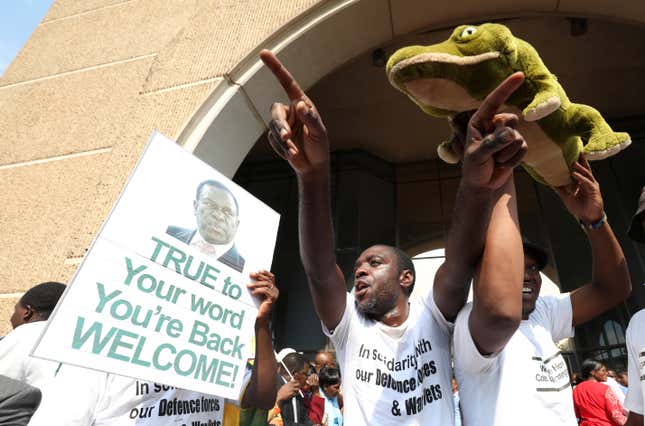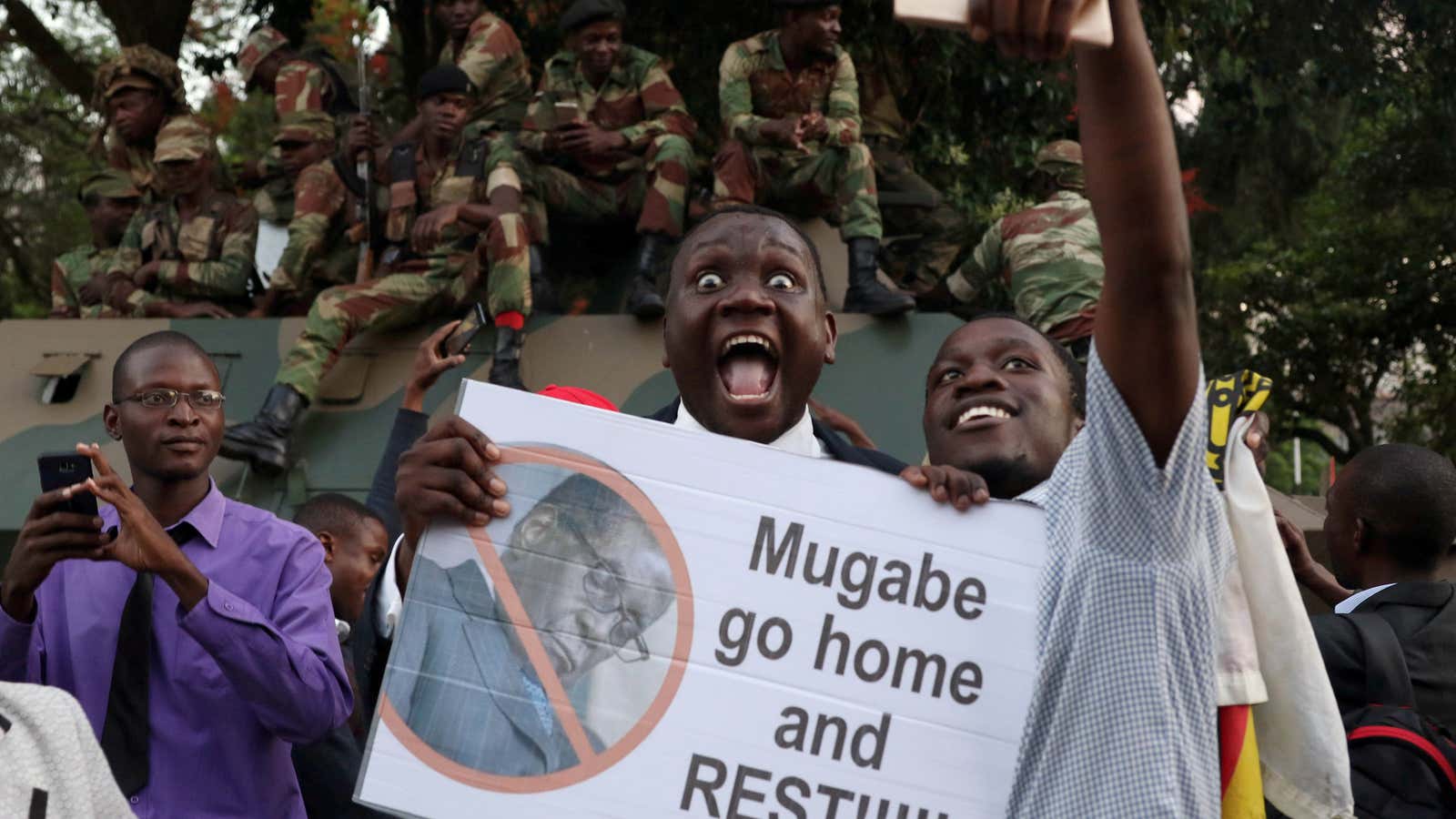Harare, Zimbabwe
Zimbabweans tooted their car horns, draped flags over their shoulders and gathered to celebrate the fall of a long time leader whom they believe has presided over their misery as a country, epitomized by job losses, company closures and an iron fist rule that trampled on human rights, property rights and disregarded protection of investments.
It was shortly before 6pm on Tuesday when the news broke out amid a joint sitting of the house of assembly and senate to impeach president Robert Mugabe. The Zimbabwean leader, in power since independence from Britain in 1980, had been digging in and even said he would preside over a special congress of his party next month but the people of Zimbabwe, united in their resolve to see him out. Eventually, he gave in and resigned.
On Tuesday they took to the streets and expressed their happiness in a moment that resembled scenes inside a stadium after a soccer world cup victory. Most told Quartz Africa they were happy. But there were some who said they were sad Mugabe had gone in a manner unbefitting of a man many still believe was the country’s liberator in his early days.
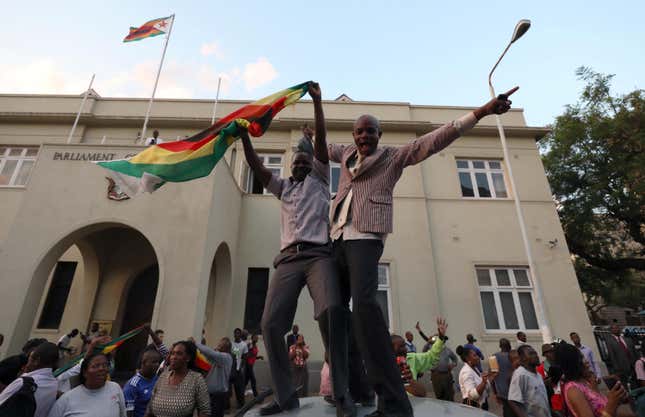
“It is all over. It has come to an end and it is an era that brought pain. He should have listened and gone earlier,” said Munashe Tagwara, 48, who runs a clothing boutique shop along Nelson Mandela Street in central Harare. Many local youth gathered at the Africa Unity Square opposite the parliament building in Harare. They danced and sang in happiness.
Like many Sub Saharan Africa countries, Zimbabwe is young country with a median age of around 20. Around 60% of the country is under the age of 25. At least 70% of Zimbabweans have known no other president than Robert Mugabe. Some carried signs declaring this moment as the, “Real Independence”.
Next to the parliament building, military armored personnel carriers are still stationed and armed soldiers stand guard. When the news broke, the soldiers were mobbed by the crowd gathering at the parliament building.
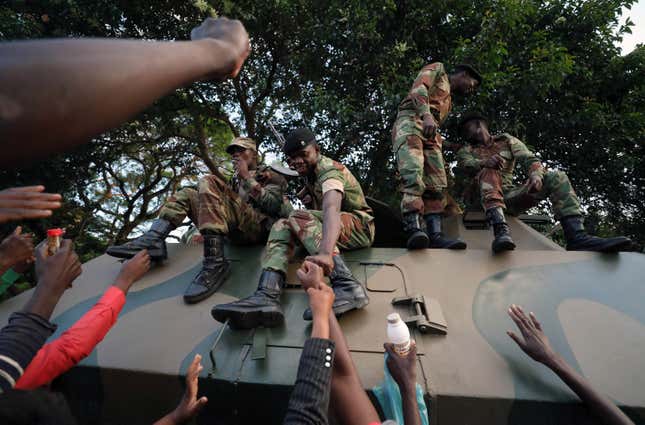
“The soldiers are brave and they have achieved what they started last week. Mugabe was a big burden and I can heave a sigh of relief now from this evil man who denied us freedom and opportunities inside our country,” 23-year old Vivian Munjoma, who is unemployed said as she climbed on top of one of the military vehicles near parliament.
As president Mugabe resisted calls for him to step down earlier this week, the #Tajamuka online campaign and pressure group had lobbied for a mass demonstration in Harare tomorrow. School buses from as far as Mutare had bussed people to come and demonstrate against Mugabe in the capital.
William Ruketo is one of those that had heeded the call. He was inside one of the buses when the news broke, mostly through social media, way before the radio stations had carried the news. He said: “It is a happy moment and our mission has been accomplished. We were not going to leave this place until Mugabe had stepped down. This brings opportunities for me and for my children whom we are struggling to send to university.”
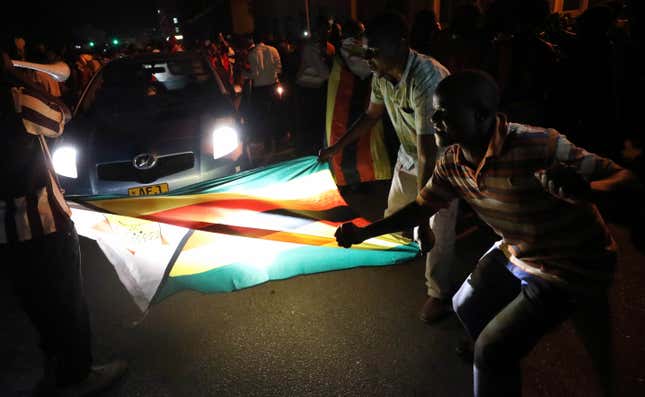
But the happiness in central Harare was often tainted by some sombre recollections, especially by the older generation members who feel this was not a good way for Mugabe to leave power.
“I am happy but I am close to tears for the old man. He was a liberator in his early days and he should have not gone this way, said Johannes Nyamweda, 56. Nyamweda had come from Harare’s Sunningdale neighborhood to withdraw money from the bank because he’d heard the bank had run out of cash again after people had been queuing all day. Despite being caught up in a prime example of the economic mishaps of Mugabe’s more recent years he remained nostalgic for “Mugabe the liberator”.
“He ignored calls to sort his issues and to go earlier now it has come to this,” said Nyamweda. “We are celebrating, but let’s remember that he has championed policies against whites.”
Many former party officials, senior civil servant and former government ministers have been very quick to switch sides and publicly pledge allegiance to the new incoming regime—whoever that might be. But some former Mugabe loyalists still felt it was important to acknowledge their former leader.
Saviour Kasukuwere, who served under Mugabe as political commissar in Zanu PF and as local government minister, tweeted his farewell to Mugabe shortly after 17:00 Harare Time.
https://twitter.com/Hon_Kasukuwere/status/932991098972200961
Jonathan Moyo, who had become pivotal as a policy advisor and trusted lieutenant of Mugabe and had been arrested at one point by the military, also said goodbye to Mugabe via Twitter.
https://twitter.com/ProfJNMoyo/status/933001504599965697
On Wednesday, supporters we out in force to welcome home, Mugabe’s presumed successor, Emmerson Mnangagwa, the former vice president whose ouster three weeks ago, had kicked off the series of political events and turmoil which led to the military stepping in to remove the president. Mnangagwa, who is nicknamed “The Crocodile” was returning from South Africa where he had met with president Jacob Zuma.
